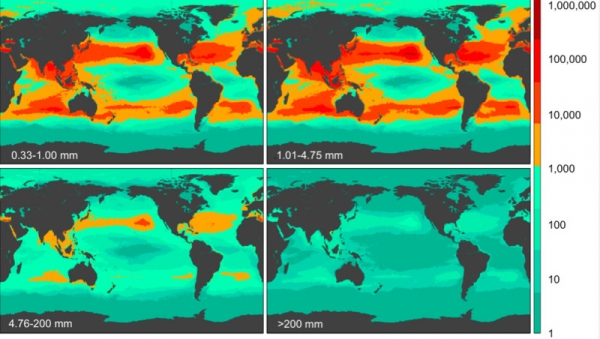Plastic-pollution-in-oceans-10-times-worse-than-previously-thought
Page 1 of 1
 Plastic-pollution-in-oceans-10-times-worse-than-previously-thought
Plastic-pollution-in-oceans-10-times-worse-than-previously-thought
Plastic Pollution in Oceans 10 Times Worse Than Previously Thought
Cut out your use and purchase of PLASTICS! Buy re-usable plates, cups and food storage. Bring a cloth bag to go shopping. Get a re-usable water bottle instead of buying bottled water, and stop buying plastic junk you do not need. Do not get plastic lids and straws when you get that soft drink. You do not need a straw and lid to drink that soda!

Plastic Pollution in the World's Oceans: More than 5 Trillion Plastic Pieces Weighing over 250,000 Tons Afloat at Sea
It turns out that plastic pollution in the world's oceans is 10 times worse than previously thought, according to a new study.
Nearly 269,000 tons of trash may be floating in our vast oceans, way more than past estimates indicated. Scientists had also suggested that some of this plastic debris was mysteriously disappearing into some unknown sink, or ending up in "plastic islands" bobbing on the surface.
To more closely figure out how much waste is being dumped into marine ecosystems, an international team of scientists combined visual estimates of trash volume with data collected from trawling the oceans with nets in places like coastal Australia, Bay of Bengal, and the Mediterranean Sea.
Based on the data, the research team found that a whopping 5.25 trillion plastic particles now call the oceans their home - and that's just a minimum. Nearly 75 percent of that weight came from large plastic objects such as buoys, buckets and other fishing gear, the new report says.
The waste of everyday life, from plastic bags to water bottles, has been pouring into the oceans for decades. The majority of it ends up along coastlines or in one of the oceans sub-tropical gyres - a large system of circular ocean currents formed by global wind patterns, according to National Geographic.
These gyres then act as conveyer belts and transport some of the plastic pollution into the most remote parts of the ocean, creating in some cases floating islands like the Great Pacific Garbage Patch, a trash-filled region of the Pacific Ocean the size of Texas.
"Our findings show that the garbage patches in the middle of the five subtropical gyres are not the final resting places for the world's floating plastic trash. The endgame for micro-plastic is interactions with entire ocean ecosystems," researcher Marcus Eriksen, who was involved in the study, said in a statement.
About 32 million tons of plastic is generated annually in the United States alone, some of it broken down by sunlight and ocean currents to end up as microplastics, which threaten marine animals from small invertebrates to large mammals.
Cut out your use and purchase of PLASTICS! Buy re-usable plates, cups and food storage. Bring a cloth bag to go shopping. Get a re-usable water bottle instead of buying bottled water, and stop buying plastic junk you do not need. Do not get plastic lids and straws when you get that soft drink. You do not need a straw and lid to drink that soda!

Plastic Pollution in the World's Oceans: More than 5 Trillion Plastic Pieces Weighing over 250,000 Tons Afloat at Sea
It turns out that plastic pollution in the world's oceans is 10 times worse than previously thought, according to a new study.
Nearly 269,000 tons of trash may be floating in our vast oceans, way more than past estimates indicated. Scientists had also suggested that some of this plastic debris was mysteriously disappearing into some unknown sink, or ending up in "plastic islands" bobbing on the surface.
To more closely figure out how much waste is being dumped into marine ecosystems, an international team of scientists combined visual estimates of trash volume with data collected from trawling the oceans with nets in places like coastal Australia, Bay of Bengal, and the Mediterranean Sea.
Based on the data, the research team found that a whopping 5.25 trillion plastic particles now call the oceans their home - and that's just a minimum. Nearly 75 percent of that weight came from large plastic objects such as buoys, buckets and other fishing gear, the new report says.
The waste of everyday life, from plastic bags to water bottles, has been pouring into the oceans for decades. The majority of it ends up along coastlines or in one of the oceans sub-tropical gyres - a large system of circular ocean currents formed by global wind patterns, according to National Geographic.
These gyres then act as conveyer belts and transport some of the plastic pollution into the most remote parts of the ocean, creating in some cases floating islands like the Great Pacific Garbage Patch, a trash-filled region of the Pacific Ocean the size of Texas.
"Our findings show that the garbage patches in the middle of the five subtropical gyres are not the final resting places for the world's floating plastic trash. The endgame for micro-plastic is interactions with entire ocean ecosystems," researcher Marcus Eriksen, who was involved in the study, said in a statement.
About 32 million tons of plastic is generated annually in the United States alone, some of it broken down by sunlight and ocean currents to end up as microplastics, which threaten marine animals from small invertebrates to large mammals.
Guestuser- Posts : 1
Join date : 2014-12-14
 Similar topics
Similar topics» Global Warming is Getting WORSE! WAY WORSE!
» Making plastic from CO2
» Cut Plastic Out Of Your Life TODAY!
» Plastic Bottles, Fleece & Face Scrub
» Italy to ban plastic shopping bags on January 1
» Making plastic from CO2
» Cut Plastic Out Of Your Life TODAY!
» Plastic Bottles, Fleece & Face Scrub
» Italy to ban plastic shopping bags on January 1
Page 1 of 1
Permissions in this forum:
You cannot reply to topics in this forum|
|
|

